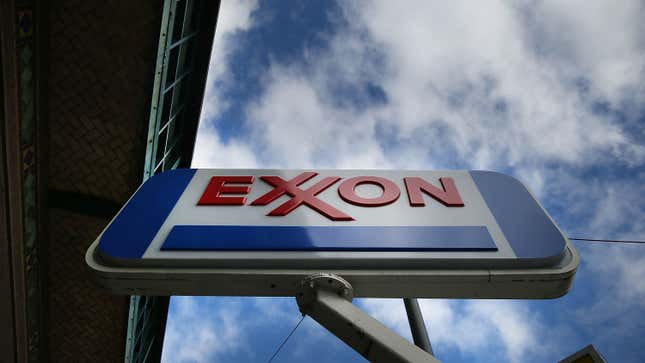
On Wednesday, Chevron became the biggest oil company in America. It’s the first time Exxon and its predecessor, Standard Oil, haven’t occupied the throne since the late 1800s. RIP to a real(ly bad) one.
The covid-19 pandemic has not been kind to Exxon. It’s lost over $1 billion since the crisis began, with its analysts noting that if oil prices don’t increase, its proven oil reserves could drop 20%. In August, it fell off the Dow Jones for the first time in nearly a century. And last week, its analysts warned it likely saw its third consecutive quarterly loss, meaning it’s now relying on debt to pay for its capital expenditures and dividends. Because energy giants are gonna energy giant, the company has taken this crash out on workers.
Exxon’s grand decline has come despite its best efforts to be the fossil-fueliest fossil fuel company around. Unlike some of its major industry competitors, the corporation hasn’t disclosed its emissions forecasts or committed to ramping down fuel production. In fact, leaked documents earlier this week showed it plans to ramp up its emissions dramatically.
Among Big Oil, Exxon’s climate plan was dead last in a recent analysis by Oil Change International. In fact, it was one of just two companies that didn’t meet a single one of the organization’s measures. The other was—guess who?—Chevron, its biggest competition, which has similarly failed to make a plan to reach carbon neutrality or set long term goals to phase out oil production, among other metrics.
On the one hand, this may show that bad climate plans have helped both companies have stayed dominant by polluting. Exxon and Chevron have both maintained a bigger market share than competitors who have paid lip service to making changes to mitigate their impact on the climate.
But on the other, it shows that committing to drilling for more oil and gas won’t save these companies. The pandemic has accelerated a fall in the fortunes of American oil companies; Chevron’s share price has dropped 39% in 2020, while Exxon’s has fallen by 52%. But Exxon and Chevron aren’t alone in this decline either. Because of falling demand for fossil fuels, faux-woke oil companies like BP are crashing, too. Dozens of smaller players are also struggling to pay loans or going bankrupt as well. The data is showing us that the reign of fossil fuels may be coming to a long-overdue end, and that expanding oil and gas production is no longer a profit-making strategy.
But that’s not to say we should just let this market decline work its magic. As Oil Change’s recent study shows, even the highest-ranking energy companies’ plans for the transition are completely unscientific and dangerous from a climate perspective. Plus, the firms have basically no policies in place to protect their workers or the environment amid their decline.
That’s why regulators should step in, ensuring the transition away from fossil fuels happens in a carefully planned manner that protects workers from being left with nothing. Polls show voters want this, too. It’s time for our leaders to realize that there’s no point in pledging allegiance to a failing industry. The transition away from fossil fuels is happening because of economics and because it has to. But the future of the planet and industry workers depends on how that transition goes.